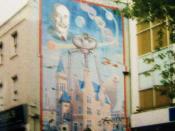Before H.G. WellsÃÂ career began, his development and inspiration for literature started because he broke his leg and was later diagnosed with tuberculosis. These medical issues caused Wells to occupy himself with reading and then finally decide to become a writer. Although he started as short story writer in Science Schools Journals much of his financial support came from his ÃÂprofessional cricket careerÃÂ (Galen 252). His first stories provided the foundation of modern genre of science fiction and were used in one of his books, The Time Machine. Because Wells had such a satirical and pessimistic view of society, he foretells a future of a nightmare-like utopia. Wells, the author of the The Time Machine, ultimately presents an argument against the consequences of future time travel by using his view of the world, its greedy society, and his attitude towards fate.
Wells depicts the fate of the world through a character, The Time Traveler, who goes through all of the outcomes of this corrupted world.
He creates a time machine which he uses to go to the future. He ends up in the year 802,700 and experiences all of these changes that Wells predicts will happen. In the future, individuality no longer exists and ÃÂhumansÃÂ are divided into two species or groups of people. The Eloi are presented as herbivores and peaceful people, but are the modern capitalists who lives comfortable lives over those who work all day, everyday. Because The Time Traveler only meets the Eloi first, the ÃÂEloi appear to be only raceÃÂ but just not ÃÂmasculine enough to be plausible patriarchal rulersÃÂÃÂ (Hume 42). So he meets the other side of society, the Morlocks. Morlocks are these ferocious, barbaric group of people who were meant to represent the working class of today. ÃÂWells extrapolated to...


